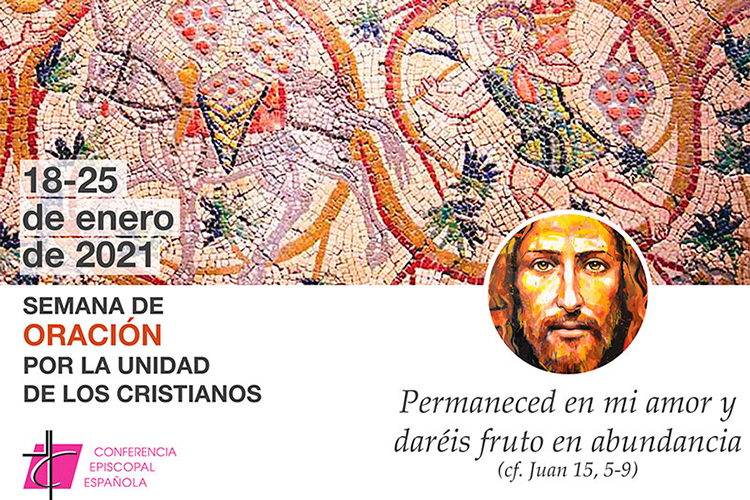Week of Prayer for Christian Unity 2021
Since 1908, the Week of Prayer for Christian Unity has been celebrated every year from January 18 to 25. It was the first ecumenical initiative supported and encouraged by the Catholic Church.
The target The main objective of this proposal is to double. First, it is a a propitious time to know and feel the pain and the drama of the divisions within the Church of Christ.. These divisions, which have arisen throughout history mainly because of the sin of Christians themselves, but also because of complicated historical, cultural, social and theological processes, wound the ecclesial being and are a scandal to the world.
On the other hand, this week of prayer, as its name suggests, is a week of prayer. an invitation to pray, to implore, to beseech, to ask for the grace of unity for all Christians in the certainty that this is a gift from heaven, it is the work of the Spirit in us. Only from a dynamic of ever deeper and more sincere conversion to God of each of the faithful and of the Churches and Christian communities, will we be able to reorient our lives towards the Unity that is the life of the Trinity and that flows from it as grace for the world. Thus, with this annual ecumenical event, it is underlined that other possible ecumenical initiatives, at the theological, social and testimonial levels, find their foundation and encouragement in spiritual ecumenism.

Each year the material to guide prayers and meditation keys The daily Mass is prepared by a group of Christians of various denominations, generally from the same region or country. This year, 2021, it was the Community of Grandchamp who took on this task. The chosen theme introduces us to the Heart of Christ, to his life of communion with the Father and his desire for communion with mankind, by orienting us towards the so-called "farewell discourses" of the Gospel of John, in chapters 14 to 17. Specifically, the quotation is from Jn 15:5-9, in which the image of the vine and the branches symbolizes communion with Christ as the only way to communion among brothers and sisters. "Abide in my love and you will bear abundant fruit.".
This year we are also invited to get to know the ecumenical witness of the Grandchamp community. A female religious community born in the heart of the Protestant Reformation in the midst of the Second World War. The birth of an experience of religious life is, in the history of the Reformation, an event of grace of the Spirit, which in its creativity continues to give rise to new evangelical experiences and to renew the life of the faithful. Since the abolition of the religious vows by Luther in the 16th century, religious life had disappeared in Protestantism, and yet, at such a crucial moment in history as the first half of the 20th century, in response to the terrible humanitarian drama of the Second World War, with a strong ecumenical and contemplative imprint there arose, very much in harmony with the Taizé Community, This experience of monastic inspiration within the Churches of the Reformation, thus ratifying what the Second Vatican Council will declare as ecclesial elements that are present outside the visible enclosure of the Catholic Church and that, since they come from Christ and belong by right to the Church of Christ, show that we are already living a unity among Christians, not complete, but real and true.
Settled in Switzerland, on the shores of Lake Neuchâtel, the community of Grandchamp began thanks to a small group of women who felt a growing desire to open up paths of spirituality for themselves and others through retreats, prayer meetings and spiritual formation. These were held sporadically in Grandchamp, but they became so serious and strong that some of them felt called to start a community life dedicated mainly to prayer, work and hospitality.
In 1940, the first of these women settled in Grandchamp and was joined almost immediately by another. In 1944, Geneviève Micheli arrived and led the community in its first steps until she passed the baton to Sr. Minke de Ivres, who was responsible for the community for almost thirty years from 1970, accompanying and supporting the difficult years of maturing and consolidation of the community. In the early years, the sisters elaborated their rule of life under the protection of the Taizé Community and under the influence of the book of the great Protestant theologian Dietrich Bonhoeffer. Community living.
The community has been growing, and is currently made up of more than fifty sisters from different countries and Christian denominations, with some missionary or mercy experiences in other parts of the world, especially those most marked by poverty or injustice.
The hayloft of the old farmhouse that was once the monastery of Grandchamp is the present chapel of the community. It is a precious icon of this life: the image of the Trinity of Rublov in the center, the Word always open, a large wooden cross, simple and poor as was the life of Christ on this earth, beautiful and harmonious in fraternity, open to the world, joyful and full of color. Its evangelical style, inspired by the first Christian communities of Jerusalem, has made of this place and this fraternity of life a space of communion and unity where every Christian can feel recognized, welcomed and loved unconditionally.
Prioress of the Monastery of the Conversion, in Sotillo de la Adrada (Avila). She is also a professor in the Faculty of Theology at the San Dámaso Ecclesiastical University in Madrid.








